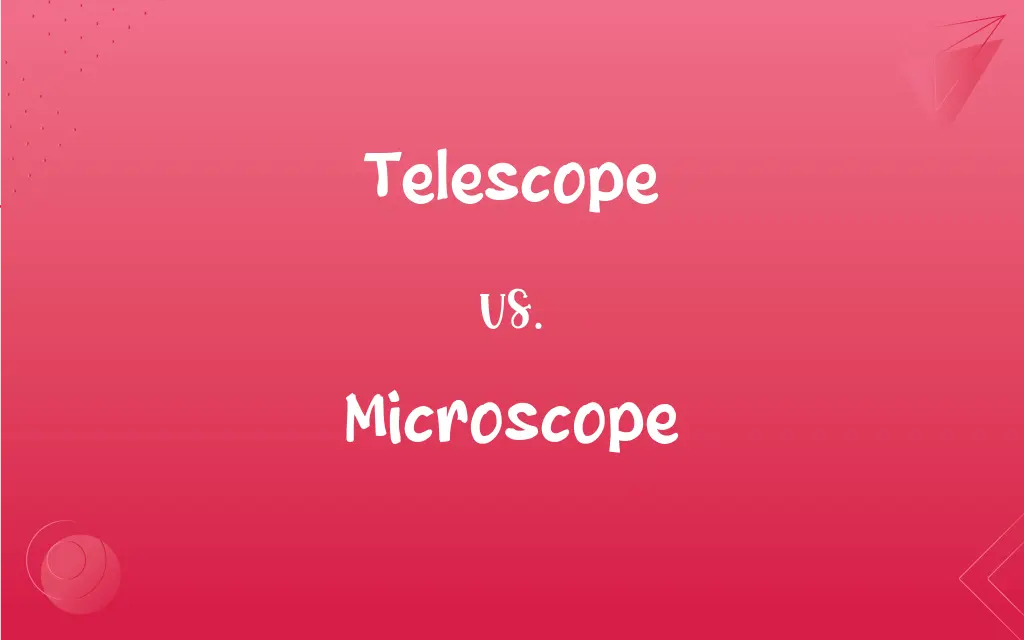Telescope vs. Microscope: What's the Difference?
Edited by Harlon Moss || By Janet White || Published on December 2, 2023
A telescope magnifies distant celestial objects for astronomical observation, while a microscope magnifies tiny objects or organisms for detailed study.

Key Differences
Telescopes are designed for observing distant celestial bodies like stars, planets, and galaxies. Microscopes, in contrast, are used to magnify and study small objects or organisms that are too tiny to be seen with the naked eye.
Telescopes magnify distant objects and are measured in terms of light-gathering ability and resolution. Microscopes, however, magnify small objects and are evaluated based on magnification power and resolution at a microscopic scale.
Telescopes typically use lenses or mirrors to gather and focus light from distant objects. Microscopes use a series of lenses to magnify and resolve fine details of small specimens.
Telescopes are instrumental in the field of astronomy and astrophysics. Microscopes are essential in biology, microbiology, and materials science for examining cellular structures, microorganisms, and material properties.
Telescopes come in various forms like refracting, reflecting, and radio telescopes. Microscopes also have different types, including compound, electron, and fluorescence microscopes.
ADVERTISEMENT
Comparison Chart
Primary Use
Observing celestial bodies
Examining small objects or organisms
Magnification Type
Distant objects, large scale
Tiny objects, microscopic scale
Key Components
Lenses or mirrors, mount
Lenses, stage, illuminator
Field of Application
Astronomy, Astrophysics
Biology, Microbiology, Material Science
Varieties
Refracting, Reflecting, Radio
Compound, Electron, Fluorescence
ADVERTISEMENT
Telescope and Microscope Definitions
Telescope
Uses lenses to form images of distant objects.
The refracting telescope provided a clear view of the lunar surface.
Microscope
Uses multiple lenses for high magnification.
The biologist used a compound microscope to examine the cells.
Telescope
Employs mirrors to gather and focus light.
The large reflecting telescope captured stunning images of distant galaxies.
Microscope
Achieves high resolution using electron beams.
With the electron microscope, we observed the virus's structure.
Telescope
A device for viewing distant celestial objects.
Through the telescope, we could see the rings of Saturn.
Microscope
Provides a three-dimensional view of samples.
The stereo microscope was used to study the insect's anatomy.
Telescope
Detects radio emissions from space.
The radio telescope is instrumental in studying cosmic phenomena.
Microscope
A small, handheld microscope for portability.
The pocket microscope was perfect for quick field observations.
Telescope
A compact, easily transportable telescope.
We took the portable telescope on our camping trip for stargazing.
Microscope
Incorporates a camera for digital imaging.
The digital microscope allowed us to capture and analyze the images on a computer.
Telescope
An arrangement of lenses or mirrors or both that gathers light, permitting direct observation or photographic recording of distant objects.
Microscope
An optical instrument that uses a lens or a combination of lenses to produce magnified images of small objects, especially of objects too small to be seen by the unaided eye.
Telescope
Any of various devices, such as a radio telescope, used to detect and observe distant objects by their emission, absorption, or reflection of electromagnetic radiation.
Microscope
An instrument, such as an electron microscope, that uses electronic or other processes to magnify objects.
Microscope
An optical instrument used for observing small objects.
Microscope
Any instrument for imaging very small objects (such as an electron microscope).
Microscope
To examine with a microscope, to put under a microscope (literally or figuratively).
Microscope
An optical instrument, consisting of a lens, or combination of lenses, for making an enlarged image of an object which is too minute to be viewed by the naked eye.
Microscope
Magnifier of the image of small objects;
The invention of the microscope led to the discovery of the cell
FAQs
What is a telescope?
An optical instrument for observing distant objects, especially in space.
What is a microscope?
A device to magnify small objects or organisms for detailed study.
Can telescopes view objects on Earth?
Yes, but they are primarily designed for celestial observations.
Can telescopes capture images?
Yes, many modern telescopes can capture images, often using cameras.
Are microscopes used in astronomy?
No, microscopes are for viewing very small, close objects.
Is it possible to see bacteria with a telescope?
No, bacteria are too small and require a microscope.
Can both devices magnify at the same level?
No, they have different magnification capabilities suited to their purposes.
Are telescopes easy to operate?
Basic telescopes are user-friendly, but advanced models require expertise.
What's a good beginner's telescope?
A small refracting or portable telescope is ideal for beginners.
What’s the main difference in function between a telescope and microscope?
Telescopes magnify distant objects, while microscopes magnify small, nearby objects.
Do microscopes come in different types?
Yes, including compound, electron, and stereo microscopes.
Can I see planets with any telescope?
Most telescopes can view planets, but image clarity varies with quality.
What maintenance does a telescope require?
Regular cleaning of lenses/mirrors and proper storage.
Are stereo microscopes used in electronics?
Yes, they are often used for inspecting circuit boards.
Can microscopes magnify up to a million times?
Electron microscopes can, but not typical light microscopes.
Can microscopes be connected to computers?
Yes, especially digital microscopes.
Do I need special training to use a microscope?
Basic microscopes are simple to use, but advanced types may require training.
Can microscopes only see living things?
No, they can observe both living and non-living samples.
Are there telescopes for amateur astronomers?
Yes, there are many telescopes designed for amateurs.
Do microscopes need electricity?
Some do, especially those with digital components or illuminators.
About Author
Written by
Janet WhiteJanet White has been an esteemed writer and blogger for Difference Wiki. Holding a Master's degree in Science and Medical Journalism from the prestigious Boston University, she has consistently demonstrated her expertise and passion for her field. When she's not immersed in her work, Janet relishes her time exercising, delving into a good book, and cherishing moments with friends and family.
Edited by
Harlon MossHarlon is a seasoned quality moderator and accomplished content writer for Difference Wiki. An alumnus of the prestigious University of California, he earned his degree in Computer Science. Leveraging his academic background, Harlon brings a meticulous and informed perspective to his work, ensuring content accuracy and excellence.







































































